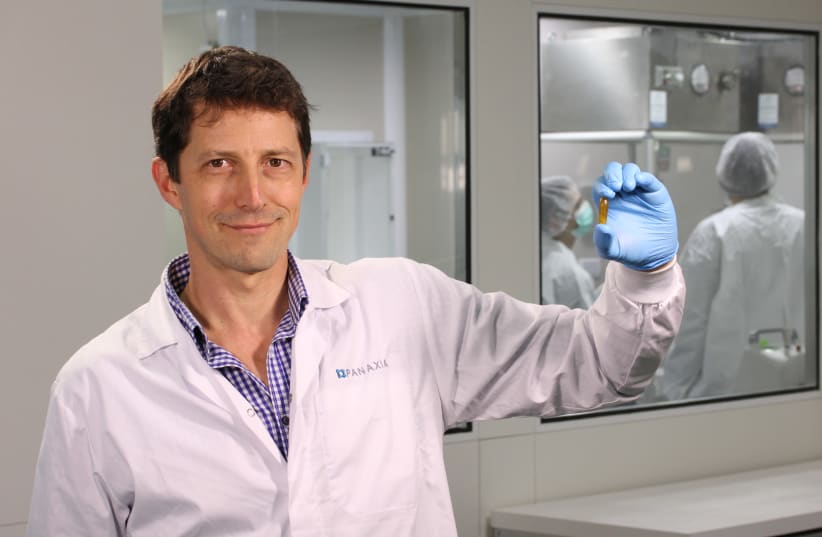A first shipment of Israeli medical cannabis products took off to Israel over Passover – an important milestone for Israel’s largest manufacturer of medical cannabis products.
Panaxia Israel Laboratories shipped medical cannabis products under the Panaxir brand from the company’s series of oils after they were selected by the government of Cyprus, which will transfer them to pharmacies for prescription sales.
The company has been working on getting its products into the European market for nearly three years. Cyprus is the third country to welcome Panaxia; it also exports to Germany and, more recently, France.
“The reputation we gain in such transactions will open doors in other countries as well and allow us to penetrate additional markets,” Panaxia CEO Dr. Dadi Segal said.
After a year of economic crisis in the country – Panaxia was also hard hit – the company is eyeing new exports as a “cure for the economic coronavirus crisis.”
General manager and co-founder Assi Rotbart told The Jerusalem Post that with nearly 200 employees in Israel (more than 1,000 if you count the cannabis cultivators from which it buys its raw materials), penetrating the European market could mean that “we can create a huge stream of money from Europe to Israel and create many more jobs.”
During COVID, the company was hit hard from a production and operation perspective.
“There was a lot of quarantine and we had to work in capsules, which increased the cost of production significantly,” Rotbart said.
But at least in Israel, the company did not miss a single delivery. “COVID pushed us to the edge to be able to deliver all the products [requested],” he said, “but we managed it, so the patients felt almost no influence.”
Panaxia was founded by Segal, Rotbart and Dr. Eran Goldberg, as the cannabis division of the Segal Pharma Group, which has been operating for over four decades and produces more than 600 products.
It was the first cannabis company to receive approval from the Health Ministry for the production of medical cannabis-based products (IMC-GMP standard), and the only one in Israel to receive EU-GMP European production standard from a health authority in the European Union, which is required for the commercial export of medical cannabis to Europe.
The company produces dozens of medical cannabis-based products through its local operation and its subsidiary Panaxia USA. These include sublingual tablets, lozenges, oils, inhalers and more. Its products are not “drugs,” and they are not meant to cure any diseases. Rather, they are designed to treat suffering from diseases, such as post-traumatic stress disorder, cancer, chronic pain, epilepsy and anorexia.
“Most of the players started as cultivators and growers and moved into medical cannabis,” Rotbart explained. “We did it the opposite way – we started in pharma and moved to medical cannabis.”
THE COMPANY believes that cannabis can be extremely helpful for many indications, he said, but that patients should never be asked to “smoke their medication.” As such, they spent more than six years researching and developing how to take the effective compound out of the cannabis plant and formulate it to work like any other medication.
Despite the time and effort it took the team, Rotbart said that “it is much more exciting than any hi-tech job I did before because for the first time in my professional career, it is not only a business. I really see the patients, the people we are helping. Sometimes I find myself working weekends and holidays because I know there are patients on the other side.”
The company is committed to providing products to Israel, where regulations changed in 2017 enabling them to sell their products. But two years ago, it started eyeing the European market, where clients pay three times as much for the same product and “competition in Europe is more limited because the standards are much higher, and the competition is lower.”
At the end of last year, it scored a commercial win, becoming the first Israeli company to set foot in Germany, a market that is projected to reach several billion euros within a few years.
Then, earlier this year, the company was selected out of 300 international companies to participate in a pilot program to open the medical cannabis market in France. Panaxia will export two types of cannabis oils and two types of cannabis tablets to the country.
Rotbart said that getting into the EU market is a complicated and long process. Aside from the EU-GMP, which it already achieved, each destination country has its own regulatory framework. Moreover, every shipment has to undergo additional scrutiny.
But he said that from a business perspective, the European market is the most promising. While he could not disclose which ones, he said “more European countries are already in progress.”
“We need to keep moving forward,” he said, noting that Israeli bureaucracy could also be easier. “When that first shipment was sent [to Germany] this was the game on, and now we know we have got to expand more and more – and we are in the best position to do that.”
